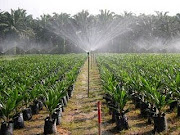Brothers gored by wild boar
NST online 2010/03/23
BALING: A 25-year-old rubber tapper received 36 stitches for deep cuts on the back, hands and legs after he was gored by a wild boar in Kampung Besah here on Sunday.
(The foto show a possible type of wild boar roaming in the nearby area)
Mohd Zubir Demat's brother, Zakaria, 34, was not spared in the attack after he went to his brother's rescue in the 7am incident. Zubir was tapping alone when the animal attacked him. Zakaria, who was tapping nearby, heard his brother's cries and went to help but the animal turned on him instead.
Both men then rushed to Baling Hospital and received outpatient treatment.
p/s: Most Planters whenever during land clearing for OP cultivation in Malaysia or other parts in the world are enjoying abundance source of exotic meats inclusive wild boar for non-muslim. They learn skills how to place traps and selecting their targeted preys. Kudos...
Nestlé water unit sale reportedly underway
3 hours ago





